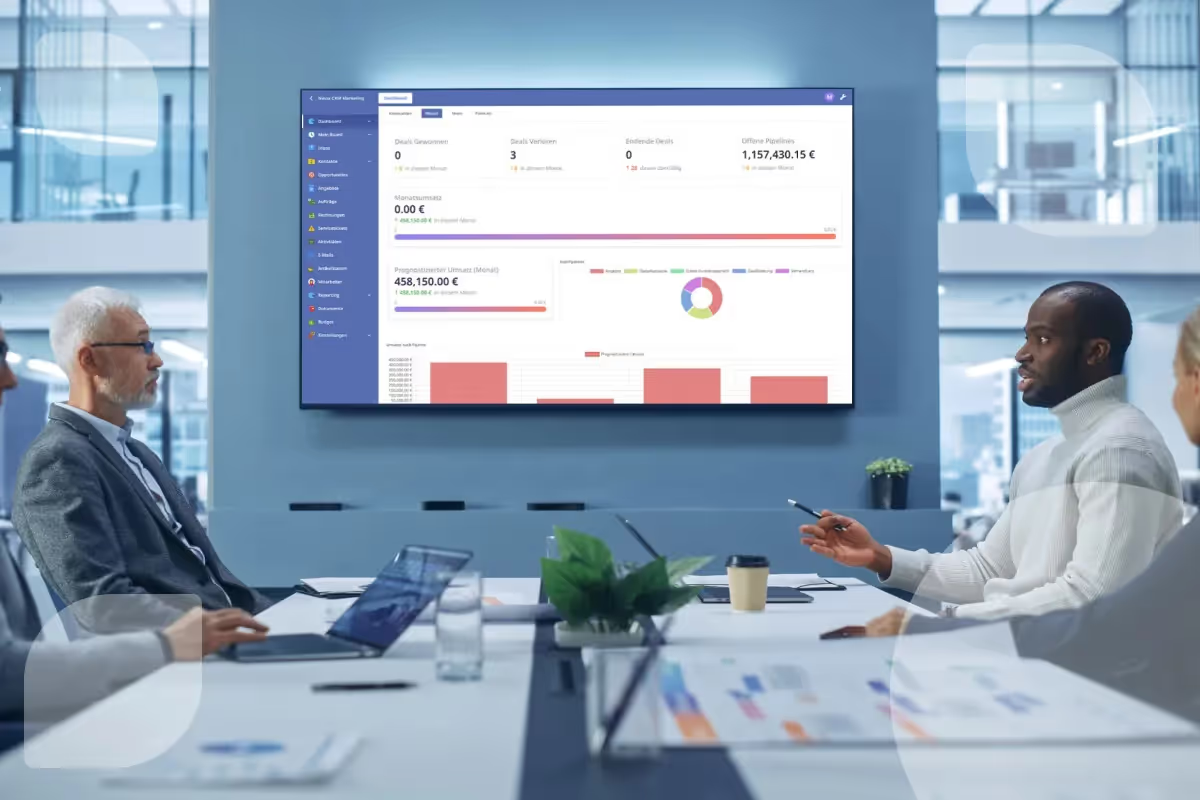Find the right software for small and medium-sized businesses

- What is SME software?
- The challenges: No digitization without efficient software
- Why do small businesses need software?
- What software do SMEs need and for what?
- Criteria for choosing the right software for small and medium-sized businesses
- A low-code application offers these opportunities
- Conclusion: Avoid silo solutions
From ERP to CRM to project management tools — the right software can help small and medium-sized businesses optimize workflows and use resources efficiently. But especially for SMEs whose budget is often limited, price and ease of use play a decisive role in addition to the range of functions.
In this blog post, we'll show you what software for small businesses, start-ups and SMBs is important and which tools you really need.
What is SME software?
Software or ERP software for medium-sized and small companies is a digital tool for small and medium-sized enterprises (SMEs). It is also known as business software or business software.
Depending on the area of application, SME software can help acquire customers and applicants, plan resources, automate processes, or manage data. Common software for SMEs include ERP or CRM systems, project management tools, document, HR and risk management. The aim of using SMB software is to make work processes more efficient.
Since the budget for the system landscape for SMEs is often lower than for large companies, a feature of software for small and medium-sized businesses is also the lower price. Software-as-a-service providers are typical, where users receive a subscription to the software for a monthly payment.

The challenges: No digitization without efficient software
The challenges of digitization are complex and illustrate the central role of efficient software solutions. Companies that operate without such solutions face various obstacles:
- No efficient processes: Without suitable software, small and medium-sized businesses can remain manual and inefficient, which hinders the implementation of digital strategies.
- High costs: Manual activities and the use of non-integrated individual solutions can lead to increased costs that could be avoided through automated processes.
- Poor collaboration and communication: A lack of tools for internal communication and collaboration impairs the flow of information and effectiveness in the company.
- A lot of time spent: Manual work processes require more time, which can lead to delays and inefficient processes.
- Lack of data security: Without specialized small business software for data security, there is an increased risk of data loss and security breaches.
- No flexibility: Without flexible software for small and medium-sized businesses, there is no ability to adapt to changing market conditions and business requirements.
- No digitization or automation: Companies without digital tools and automation options miss out on modern business practices and lose competitiveness as a result.
Why do small businesses need software?
It is a misconception that only large corporations or aspiring SMBs need software. Digitalization makes it clear that even small businesses benefit from software solutions. It not only helps to digitize and automate processes, but also to save resources.

However, it is also clear that SMEs have different software requirements than corporations. They rarely have large IT departments, but have to make do with easy-to-use solutions. As a result, small and medium-sized companies depend on solutions that are easy to install and intuitive to use.
What software do SMEs need and for what?
The selection of suitable software for small and medium-sized companies is of central importance to optimize their operational processes. A comprehensive Enterprise Resource Planning (ERP) system functions as an all-in-one solution that covers various areas. that Customer relationship management (CRM) within the ERP provides a detailed overview of customer data, which is essential for effective customer loyalty and tailor-made marketing strategies.
The ERP system itself enables small and medium-sized companies to seamlessly integrate various business areas, from finance to production. It therefore comprises the entire resource management of a company.
An integrated Project management tool Within the ERP software, small companies also support efficient planning, resource optimization and team collaboration. It also makes it easier to integrate HR software within ERP, the management of personnel processes, including payroll and personnel administration.
Concentrating on a comprehensive software solution enables SMEs to effectively manage their business processes, save resources and focus on their core business.
Criteria for choosing the right software for small and medium-sized businesses
When every department uses their own tool, chaos and inefficiency are not far off. When choosing the right software for your business, avoid silo solutions. Think holistically and look for a solution that meets as many business needs as possible.
Range of functions
The first step is to define a catalog of requirements. This is the only way to determine which functions you need for your company. However, don't make the mistake of looking at each department separately.
Silo solutions make processes inefficient. However, with ERP software for small and medium-sized companies that covers as many of your requirements as possible, you create synergy. Your entire organization can thus work towards a central goal.
Cloud solution
Cloud software is no longer a rarity today. SaaS providers provide subscriptions that allow companies to use cloud services for a monthly fee. The big advantage of cloud software is that employees can work anywhere and from any device.
Data is updated in real time in the cloud so that an employee in the office can work in a spreadsheet at the same time as the employee on the construction site. At the same time, work steps are automatically saved in the cloud and all changes are traceable in the history. This prevents data inconsistencies.

Workflow automation
Routine tasks are real time wasters and must be eliminated from everyday life. Imagine being able to automatically send first-contact emails from your CRM or send paychecks directly from HR software.
These workflow automations are important features of small business software. SMEs have to make do with limited resources, which is why it is a great advantage if the right software can free them up.
Integration option and compatibility
There is not always one solution that covers all concerns. Perhaps you have already established systems in your small business that you don't want to do without.
If you opt for new software, you must always make sure that it is compatible with other systems. Interfaces to other tools enable seamless data transfer and smooth processes.
Usability
If software is user-friendly, this contributes to employee satisfaction. On the other hand, if you confront your team with a tool that is difficult to access, you slow down the process instead of streamlining it.
Therefore, make sure that your software for small and medium-sized businesses is employee-friendly and can be seamlessly integrated into everyday business life. Good customer support and a help section (such as blog posts, video tutorials, or how-to instructions) are a sign that you are choosing the right software.
A low-code application offers these opportunities
The best software for small businesses is an individual solution. Every organization has different requirements and the more of these requirements are met, the more efficiency can be achieved through the software. Low-code solutions offer a special approach here. With little development effort, which can even be carried out by laymen, systems are created that apply precisely to the company's process landscape.

In Ninox, small businesses have the option to use a variety of templates. With just one click, you can create your own ERP, CRM or HR tool. You have countless integration options to transfer data and integrate the database into your usual process.
For SMEs that need an even more specialized solution, Ninox can be completely individualized thanks to the low-code approach. Develop your own solution that not only fits your status quo, but also offers sufficient flexibility. With Ninox, you don't adapt your business growth to the software, but you scale thanks to the software.
Conclusion: Avoid silo solutions
The search for the right software for small and medium-sized businesses requires careful analysis of requirements and the avoidance of silo solutions. A comprehensive, integrated solution that offers flexibility, ease of use and scalability is crucial to make the most of the opportunities offered by digitization. Low-code platforms such as Ninox combine all of these parameters and help SMEs achieve long-term and sustainable success.















